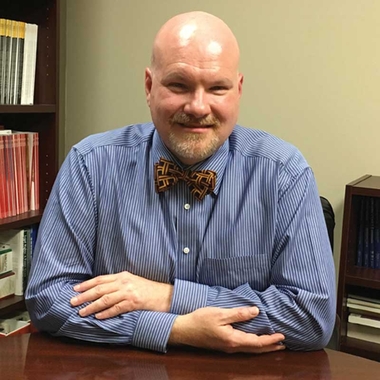LGBTQ mental health resources: Difficult to find

Dr. Bryan Struck is a geriatric medicine specialist at the Oklahoma University Medical Center in Oklahoma City. Photo by Rob Howard.
by Rob Howard
Associate Editor
“When my partner died in 2011, I felt very isolated because I couldn’t find anybody who had gone through a similar experience,” says Dr. Bryan Struck, an openly gay geriatric medicine specialist at the Oklahoma University Medical Center in Oklahoma City.
“It was very interesting when I was thinking there’s this internet out there - how do you manage grief when your partner is deceased - and there really wasn’t anything.”
As Dr. Struck quickly found out, it is difficult to find LGBTQ friendly resources when you are experiencing a mental health issue. The shocking news is that LGBTQ individuals are almost three times more likely than others to experience a mental health issue.
According to the National Alliance on Mental Illness (NAMI), “LGBTQ people must confront stigma and prejudice based on their sexual orientation or gender identity while also dealing with the societal bias against mental health conditions
As a community, LGBTQ individuals do not often talk about mental health and may lack awareness about mental health conditions. This sometimes prevents people from seeking the treatment and support that they need to get better.
Beyond the prevalence of depression, anxiety, suicidal ideation, and substance abuse, the issue becomes more complex; it is affected by what part of the community they are from – lesbians, gay men, bisexual persons, or transgender people.
It is affected by their age, and it depends on where they live – resources are likely more readily available in cities than in rural communities.
Good mental health care depends on finding sensitive, knowledgeable providers. Dr. Struck says there are provider directories online – one is by the GLMA (the Gay and Lesbian Medical Association). But, “It’s not always an up to date list,” he says. “There are providers that do this work and they may not actually be on the list. So it’s sometimes very difficult for individuals to find providers, particularly mental health providers that they can relate to.”
There are differences between the mental health needs of younger and older people, but Dr. Struck says the thing they have in common is the issue of access. “They may not be aware that there are resources out there,” he said. And, “If it’s out there, can they physically get to it?”
That raises the issue of rural health care. “It would be a problem because rural areas don’t have access to healthcare in general, and then if you start looking at access to mental health it makes it that much more difficult,” says Dr. Struck. Adding the component of being LGBTQ increases the difficulty and stress. “The fact that they were lesbian or gay may not have been known to the community.”
If you are LGBT, it boils down to a couple of issues: having knowledgeable, sensitive, caring providers, and having access to those providers.
Educating providers is a growing field. The Veterans Administration, for instance, has several programs that deal with specific LGBTQ issues, and several clinics being set up for transgender veterans. At the OU Health Sciences Center, there is a student group called Health Occupation Professionals for Equality (HOPE).
Dr. Struck says what HOPE does, “is help all these up and coming healthcare professionals that have an interest in providing quality care to have a better understanding of issues that relate to LGBTQ. We have pharmacists, and nurses, and medical students and physical therapists that come to our meetings. This is an area that they can improve their knowledge in.”
As far as getting care to people who live where it isn’t available, Dr. Struck is particularly excited about what is called Telehealth. “It is a great opportunity to use technology to provide care to people who don’t live in your immediate vicinity. This is using technology to do a face-to-face meeting with people that are remote. It can work very well with mental health visits.”
To improve LGBT mental health care, Dr. Struck says, “One thing that needs to be done is advocacy – I think if we look at mental health in general, letting people that make policy know that this is important and that resources for mental health should be just as important as resources for other illnesses. I think we need to continue to educate professionals ... that you have patients who are dealing with the fact they are LGBT,” and that they need to know how to treat those patients.
LGBTQ organizations and health providers can team together to start solving the problem of providing better care to those members of the LGBTQ community in need of mental health care.
The Gayly – July 18, 2016 @ 7:40 a.m.





